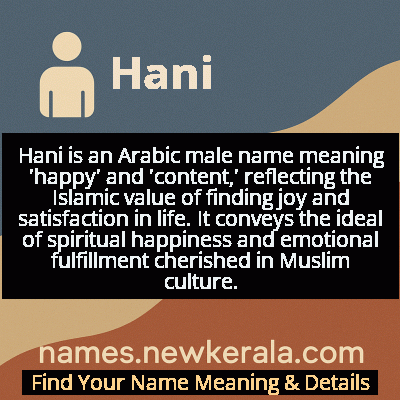Hani Name Meaning & Details
Origin, Popularity, Numerology Analysis & Name Meaning of Hani
Discover the origin, meaning, and cultural significance of the name HANI. Delve into its historical roots and explore the lasting impact it has had on communities and traditions.
Name
Hani
Gender
Male
Origin
Muslim
Lucky Number
5
Meaning of the Name - Hani
Hani is an Arabic male name meaning 'happy' and 'content,' reflecting the Islamic value of finding joy and satisfaction in life. It conveys the ideal of spiritual happiness and emotional fulfillment cherished in Muslim culture.
Hani - Complete Numerology Analysis
Your Numerology Number
Based on Pythagorean Numerology System
Ruling Planet
Mercury
Positive Nature
Adventurous, dynamic, curious, and social.
Negative Traits
Restless, impatient, inconsistent, prone to indulgence.
Lucky Colours
Green, white.
Lucky Days
Wednesday.
Lucky Stones
Emerald.
Harmony Numbers
1, 3, 9.
Best Suited Professions
Sales, marketing, travel, entertainment.
What People Like About You
Versatility, charisma, adventurous spirit.
Famous People Named Hani
Hani al-Hassan
Political Advisor
Senior political advisor to Yasser Arafat and key Fatah official
Hani Shaker
Singer and Actor
Renowned Egyptian singer and actor with numerous hit songs and films
Hani Ramadan
Islamic Scholar
Director of the Islamic Center of Geneva and prominent Islamic thinker
Hani Mohsin
Actor and Singer
Popular Malaysian actor and singer known for romantic roles
Name Variations & International Equivalents
Click on blue names to explore their detailed meanings. Gray names with will be available soon.
Cultural & Historical Significance
Across different Muslim cultures, Hani has maintained popularity due to its positive connotations and ease of pronunciation. In Arab societies, it represents the ideal of balanced character—someone who is joyful yet dignified, content yet ambitious. The name has traveled well beyond the Arab world, finding resonance in Southeast Asian Muslim communities where it adapts easily to local naming conventions while retaining its Islamic identity. This cross-cultural adaptability has made Hani a bridge between different Muslim traditions, symbolizing shared values of happiness and spiritual satisfaction that transcend geographical boundaries.
Extended Personality Analysis
People named Hani are generally characterized by their optimistic outlook and emotional stability. They possess a natural ability to find joy in everyday situations and often serve as sources of positivity for those around them. Their contentment is not passive but rather an active state of mind that allows them to approach challenges with resilience and grace. Hanis typically have excellent social skills, making them popular in their circles and effective in roles requiring diplomacy and interpersonal connection.
Beyond their cheerful exterior, individuals with this name often demonstrate depth of character and philosophical insight. They tend to be reflective and thoughtful, with a strong sense of ethics and fairness. While generally easy-going, they can be surprisingly determined when their principles are challenged. Their balanced nature makes them excellent mediators and trusted confidants. The happiness associated with their name manifests as genuine emotional intelligence rather than superficial cheerfulness, allowing them to form deep, meaningful relationships and navigate life's complexities with wisdom and composure.
Modern Usage & Popularity
In contemporary naming practices, Hani continues to be a popular choice among Muslim parents worldwide, particularly in the Middle East, Southeast Asia, and Western Muslim communities. The name maintains moderate but consistent popularity, appealing to parents who want a name that is both traditionally Islamic and modern-sounding. Its ease of pronunciation in multiple languages makes it particularly suitable for families living in multicultural environments or diaspora communities. Recent decades have seen stable usage without dramatic spikes or declines, indicating its status as a classic rather than trendy choice. The name works well in professional contexts while retaining cultural specificity, making it a practical choice for parents considering their child's future in globalized societies. Its continued popularity reflects the enduring appeal of names with positive meanings and cultural authenticity in an increasingly interconnected world.
Symbolic & Spiritual Meanings
Symbolically, Hani represents the profound Islamic ideal of contentment (rida) and spiritual satisfaction that transcends material circumstances. It embodies the concept of finding happiness through faith and inner peace rather than external achievements or possessions. The name carries metaphorical associations with emotional resilience, mental clarity, and the ability to maintain equilibrium in life's fluctuations. In broader philosophical terms, Hani symbolizes the wisdom of appreciating what one has while striving for improvement—a balance between acceptance and aspiration. The name also suggests generosity of spirit, as true contentment often manifests in sharing happiness with others and creating positive environments. In cultural contexts, it represents the ideal Muslim character: joyful without being frivolous, content without being complacent, and spiritually grounded while fully engaged in worldly life.

